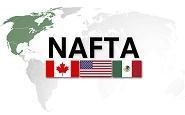Government/Policy

April 26, 2018
Deadline for NAFTA Agreement Looms
Written by Sandy Williams
NAFTA negotiators are working feverishly to reach an agreement in principle by May 4. U.S. Trade Representative Robert Lighthizer canceled plans to meet with lawmakers from the New Democratic Coalition in favor of continuing meetings with his Canadian and Mexican counterparts.
The Coalition, composed of 68 pro-trade House Democrats, hoped to have a chance to review NAFTA issues before a preliminary agreement is reached. A renegotiated agreement is subject to approval by the Senate and House and many on both sides of the aisle are uncomfortable with what they are hearing about the negotiations.
The Coalition sent a letter to Lighthizer on Thursday to outline its expectations for a new NAFTA agreement. While agreeing with the need to modernize the 20-year-old agreement, the administration’s focus is misdirected, said the Coalition, and may jeopardize the ability to secure the necessary congressional support to implement the agreement.
“We are increasingly concerned, however, that in a rush to conclude an agreement, the administration is putting its focus in the wrong places,” wrote the Coalition, adding that issues on agriculture and restrictions on government procurement threaten to reduce U.S. competiveness.
“American workers, farmers and businesses would be best served by increasing market access and certainty. Instead, the administration is crafting proposals to automatically sunset the agreement after five years and undercutting enforceability, and therefore the stability of the underlying agreement. Moreover, withdrawal threats only exacerbate the sense of uncertainty and have failed to extract concessions from our closest trading partners and will not be constructive in building support for future congressional consideration.”
On Wednesday, Canadian Foreign Minister Chrystia Freeland said good progress was being made at the NAFTA talks. “There is a very strong, very committed, good-faith effort for all three parties to work 24/7 on this to try and reach an agreement,” Freeland told reporters.
Issues still unresolved include rules of origin for North American automobiles. The U.S. has backed away from its 50 percent U.S. content requirement and has dropped its demand for 85 percent NAFTA content. Instead, the U.S. proposes accept 75 percent NAFTA content if wages equivalent to $15 per hour are counted toward regional value content. The intent is to push Mexico into revising its auto industry wages. Language proposed regarding labor laws and their enforcement continues to be disputed.
Republicans want the new NAFTA deal to include investor-state dispute settlement, which Lighthizer has tried to eliminate from the new agreement.
The five-year sunset clause proposed by Lighthizer is untenable to Canada and Mexico. Freeland called it “absolutely unnecessary,” pointing out that it would create uncertainty about the agreement, and there is already a clause in NAFTA that allows countries to withdraw from the agreement. Her rejection of the sunset clause is seconded by Mexico’s negotiators.
Negotiators discussed how to address limiting transshipment of Chinese steel through Canada into the U.S., but have yet to come to a consensus. With the May 1 deadline for imposition of Section 232 tariffs on steel and aluminum looming, talks regarding steel have been contentious.
May 4 is only one week way and it is uncertain if the negotiating partners can formulate an agreement in principle by the deadline. If Canada and Mexico are not exempted from the Section 232 tariffs on May 1, it may precipitate new difficulties for the negotiations.







